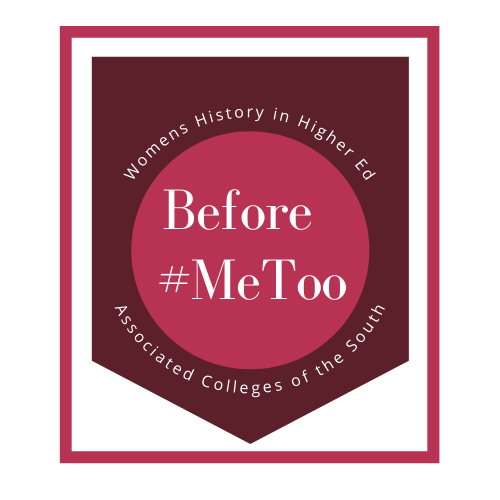The Before #MeToo project aims to examine the lived experiences of women in higher education throughout US history.
In the 2020-2021 academic year archivists and historians at five ACS institutions collaborated to embed archival research in undergraduate history curriculum, enabling students to write papers and create public facing projects centered on local women’s history topics. This blog is dedicated to documenting the work of the students, faculty, and archival professionals who contributed to this rich, year-long initiative. A further explanation of the project’s impetus and goals follows below.

The #MeToo movement has redirected public and academic interest to the daily discrimination women face in most work and educational environments. In this climate, colleges are more committed then ever to creating campuses that are safe and inclusive places for all students, and this necessitates understanding and addressing the female experience of higher education. Sexual harassment and assault have been and are still prevalent on college campuses and are notoriously difficult to track. A 2015 University of Pennsylvania study found that over 27 percent of surveyed female undergraduates had experienced non-consensual penetration or touching since entering college and more that half of those respondents had never reported the incident. (David Cantor, et. al. Report on the AAU Campus Climate Survey on Sexual Assault and Sexual Misconduct, Association of American Universities, September 21, 2015.)
Sexual assault, however, does not represent the totality of women’s experiences at college. Daily life occurrences in the classroom, athletics facilities, cocurricular spaces, and local community also contribute to the experiences of female students. In addition, the work and perceptions of female faculty and staff also represent critical stories in the historic record, though their voices are often found in different contexts and sometimes require deeper investigation. Taken together, these experiences—both positive and negative—have been layered and shaped by the intersectionality of gender with race, nationality, culture, sexuality, and events in the broader society. The complexities of these interactions should not be overlooked by the historian or the historian-in-training.
The Before #MeToo project aimed to capture this complexity for undergraduate learners by helping them discover and present the ways women—including trans women where they appear in the historic record—experienced life at participating ACS schools, or in similar educational settings across the country, through training in rigorous primary source research. History students on participating campuses were asked to consider — What did women’s education and work look like? What challenges did they face? What pastimes did they enjoy? What relationships did they forge? And what continuing connections, if any, might they still have to their campus community?
This project joins several other ACS-funded initiatives in investigating the lived experiences of minority groups at ACS schools. In 2018, Sewanee, Morehouse, and Spelman worked together on “Studies of Slavery and its Legacies,” which was a course-driven grant to explore the institutional relationship to slavery and the consequent ethical ramifications for the individual colleges. Additionally, another ongoing ACS grant, “Pathway to Diversity” is working to help students at Center College, Rollins College, Furman University, and Washington and Lee University create an online digital archive of historical materials focusing specifically on the experiences of desegregation at these small, southern, liberal arts schools in the 20th century.
Five schools—Centenary, Centre, Davidson, Richmond, and Rollins— are contributing historians and archivists to the Before #MeToo project. Each school has a unique history and a different history of women that is peculiar to their institution’s founding. Some, like Rollins, have been co-ed from the beginning, while others, like Davidson, only fully enrolled women in the 1970s. The institution’s relationship with women of color has also varied with Davidson having enslaved women on campus before the Civil War to Centenary having a close connection with Japan in the 1950s. Additionally, the schools’ religious affiliation has also dramatically affected the lives of women attending or teaching there, influencing campus culture, institutional policies, and the personal values of people on campus.
Part of the aim of the Before #MeToo project is to help undergraduates and the public be more aware of women’s college experiences and the struggles women have faced and continue to face in higher education more broadly. In addition, all participating schools share four concrete project goals with accompanying assessment mechanisms:
- To develop courses that foreground student archival research and foster a sophisticated understanding of women’s historical experiences at the various ACS schools.
- To uncover, identify, and highlight archival resources that illuminate the lives of the women at each of the participating schools.
- To encourage students in the relevant courses to formally present their work, either online or in person.
- To co-author a publication and/or presentation focusing on the development of history classroom pedagogy and the archival/departmental collaboration involved in teaching this new curriculum.
